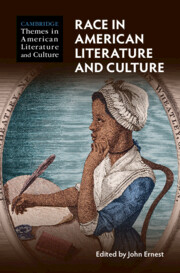Book contents
- Race in American Literature and Culture
- Cambridge Themes in American Literature and Culture
- Race in American Literature and Culture
- Copyright page
- Contents
- Contributors
- Acknowledgments
- Introduction
- Part I Fractured Foundations
- Part II Racial Citizenship
- Chapter 4 “Faithful Reflection” and the Work of African American Literary History
- Chapter 5 Beyond Protest
- Chapter 6 Affiliated Races
- Part III Contending Forces
- Part IV Reconfigurations
- Part V Envisioning Race
- Part VI Case Studies
- Part VII Reflections and Prospects
- Index
Chapter 5 - Beyond Protest
from Part II - Racial Citizenship
Published online by Cambridge University Press: 26 May 2022
- Race in American Literature and Culture
- Cambridge Themes in American Literature and Culture
- Race in American Literature and Culture
- Copyright page
- Contents
- Contributors
- Acknowledgments
- Introduction
- Part I Fractured Foundations
- Part II Racial Citizenship
- Chapter 4 “Faithful Reflection” and the Work of African American Literary History
- Chapter 5 Beyond Protest
- Chapter 6 Affiliated Races
- Part III Contending Forces
- Part IV Reconfigurations
- Part V Envisioning Race
- Part VI Case Studies
- Part VII Reflections and Prospects
- Index
Summary
African American culture is best understood as an ongoing community conversation about success that produces homemade citizenship. Because black success so often inspires violence, the community conversation constantly defines and redefines achievement. To pursue success, African Americans debate not only the strategies for attaining it but also its very contours and parameters. That is, they debate how one will even know if one has achieved. As they engage in this process, African Americans create a citizenship that is homemade. Denied basic ingredients like safety by the land of their birth, they cultivate a sense of belonging and achievement that does not depend on civic inclusion; it is a belonging with recourse beyond the nation-state. To recognize homemade citizenship, scholars, teachers, and general readers must look through the lens of achievement rather than resistance. This approach proves especially illuminating when applied to works, such as slave narratives, that readers presume exist to protest injustice. Using the Narrative of Henry Box Brown as a case study, this essay demonstrates the power of reading with an eye toward accomplishment. Brown’s narrative proves animated by a commitment to defining, redefining, and pursuing success while knowing victories inspire violence.
Keywords
- Type
- Chapter
- Information
- Race in American Literature and Culture , pp. 76 - 91Publisher: Cambridge University PressPrint publication year: 2022



